Ever wonder how some companies just seem to know exactly what you want, even before you do? Well, the cat's out of the bag: it's all about AI in Business Intelligence (BI).
In the world of business intelligence BI, a radical change is taking place and fundamentally changing the way that data is used to inform strategies, operations, and even innovation. The core of this revolution is an integration with Artificial Intelligence AI, which is a paradigm shift that's not only improving but changing the nature of BI.
The incorporation of AI into BI is a radical distinct departure from traditional procedures and ushers into a new era of data that is not only abundant but also useful. Through harnessing the potential of machine-learning algorithms as well as the natural processing of language AI-powered BI systems can sift through massive amounts of data, and find patterns or trends and patterns that are not easily discovered by human analysts. These capabilities are essential in today's business world, where agility and foresight offer crucial competitive advantages.
Additionally, AI's contribution to BI is more than just data analysis. It can provide predictions and insights that allow for strategic decision-making that is proactive and proactive. From predicting market trends to recommending the most effective business actions, AI-powered BI solutions enable businesses to navigate and determine their future.

The AI Revolution in Business Intelligence
The introduction of Artificial Intelligence into business intelligence systems is more than just a trend; it's an entire revolution that's changing the way data analysis is conducted as well as decision-making processes and business strategy in all industries.
This transformation is driven by two fundamental technologies: Machine Learning (ML) and Natural Language Processing (NLP). Together, they're transforming BI from an inactive, backward-looking process to a dynamic, forward-looking technology. For further insights into the critical role of AI in transforming business landscapes, Gartner’s exploration of AI and ML in BI provides a comprehensive overview.
Harnessing Machine Learning for Predictive Insights
Machine learning is the foundation of today's Artificial Intelligence-driven BI ecosystem, providing the ability to process, analyze, and draw conclusions from the data at a rate and speed that is unattainable to human experts. The main benefit that comes with ML for BI is its capacity to forecast future patterns and outcomes based on past data, allowing companies to shift away from a reactive approach towards a more proactive, predictive method.
Predictive Analytics: The Future of Strategic Planning
By incorporating ML algorithms in BI systems, companies can tap the full potential of predictive analytics and provide a glimpse of the future, with predictions of consumer behaviour, market trends, and revenue streams. For example, retailers use predictive analytics to predict the demand for their products, and optimize inventory levels to satisfy consumer needs without overstocking, drastically reducing costs and increasing profits. Explore our AI UX Design Review to understand how AI enhances user experiences and interfaces in BI tools, making advanced analytics accessible to decision-makers across the organization.
Natural Language Processing: Bridging the Gap Between Data and Decisions
NLP revolutionizes business communication with BI platforms, making complex analyses accessible to all, a transition detailed in IBM’s insights on AI in BI, which showcases practical applications and benefits. Through understanding and processing the human voice, NLP lets users access data and gain insight by using everyday language reducing the learning curve and increasing access to data across the company.
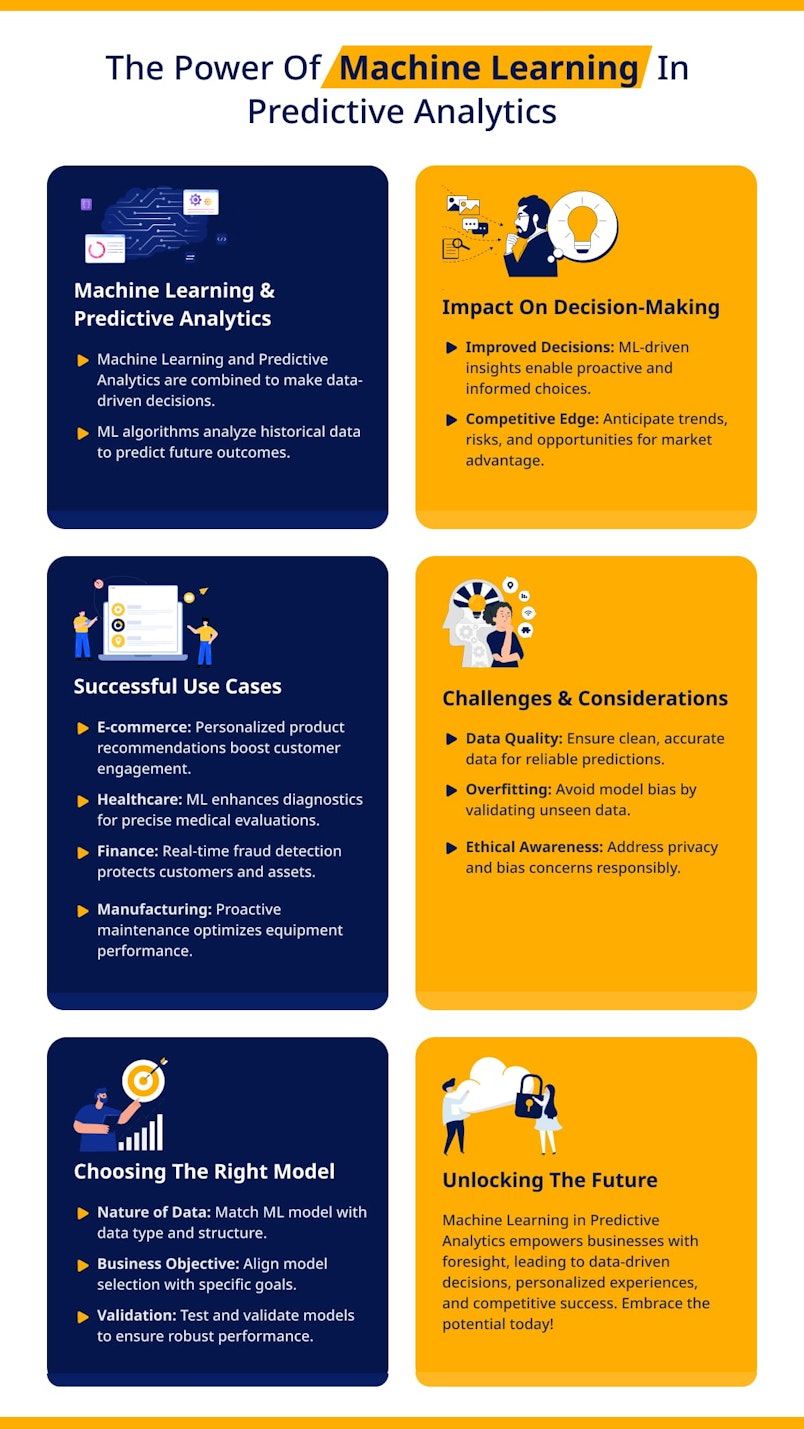
Making Data Conversational
The most revolutionary use of NLP in BI is the creation of platforms for conversational analytics. These platforms allow users to ask queries about their data using natural language, like "What was our best-selling product last quarter? Or 'How do sales this year compare to last year?' This BI software, which is powered by NLP responds to the question, analyses the data, and answers in plain English and often with visuals or dashboards to provide more information. An example of this is AskYourPDF. If you've never heard of it, we wrote about it here.
For a deeper dive into how NLP is enhancing data analytics, read about ChatGPT for Data Analysis, showcasing the potential of conversational AI in extracting meaningful insights from complex datasets.
The incorporation of ML and NLP in tools for BI is not only increasing the effectiveness and efficiency of data analysis processes, but it is also revolutionizing how businesses anticipate future scenarios, make educated decisions, and plan to increase their growth. While we study this AI advancement in intelligence for business, it's clear that these technologies are crucial in making data an asset of strategic value and empowering businesses to navigate the complexity of the business world with a sense of security and foresight.
Real-time Analytics: Agile Decision-making in Dynamic Markets
In the current business climate, which is fast-paced it is crucial to be able to make rapid, well-informed decisions that could make the key to success or failure. This has prompted the development of real-time analytics inside AI-powered BI software, giving companies the flexibility required to react to market shifts when they occur.
The Potential of Now: Transforming Data into Immediate Insights
Real-time analytics, powered by AI can process and analyze data as soon as it is generated giving businesses instant insight. This means that decision-makers have access to the most recent information available including customer behavior, financial performance, and more. For example, online platforms make use of real-time analytics to dynamically adjust prices manage inventory according to trends in shopping, and tailor customer experiences within the quick blink of an eye.
Integration of live streams of data into BI systems allows businesses to keep track of their operations continuously identify problems before they escalate and seize opportunities when they occur. The instantaneous insight generated is extremely valuable in areas that are subject to frequent changes like healthcare, finance, and retail, allowing firms to maintain their advantage in the market by being the first to react.
Discover how real-time analytics are applied in specific project contexts by exploring the SaaS AI-based Web App project, showcasing the integration of AI in streaming data analysis and decision-making processes.
Navigating the volatility using Data-driven Agility
Real-time analytics go beyond simply speeding up the process of making decisions They alter the approach an organization takes to market risk and volatility. Through the continuous flow of useful information, businesses can swiftly change strategies adapt to market needs, and manage risk more efficiently. This degree of flexibility is crucial in navigating the uncertainty of the current business environment which is why delays in making decisions can lead to unintentionally missed opportunities or increased vulnerability.
Additionally, the use of AI to analyze real-time data enables the automated decision-making process in routine activities that allows humans to be strategists and analysts who can concentrate on more complicated and high-value tasks. This combination of humans and AI improves strategic depth in a company, encouraging creativity and improving operational efficiency.
The potential of real-time analytics in AI-powered BI systems is not only in the speed at which insights are uncovered but also in the impact it can have on the organization's flexibility and agility.
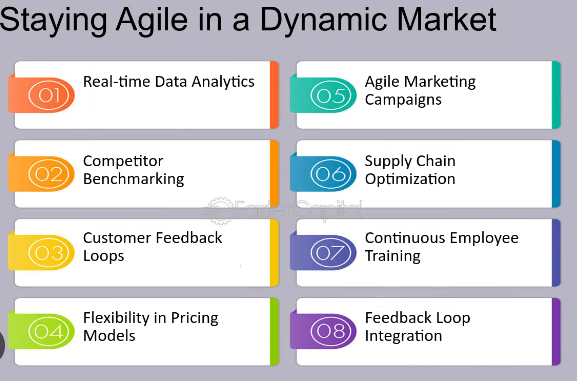
Top 5 AI-powered Business Intelligence Tools
How do you transform a sea of data into strategic gold?
In the digital age, the answer lies in the powerful alliance between artificial intelligence (AI) and business intelligence (BI) tools. These innovative platforms are the key to unlocking actionable insights from data, offering a competitive edge through smarter, swifter decision-making processes.
Let's take a look at the top 5 AI business intelligence tools, showcasing their unique capabilities to revolutionize data analysis and business strategy.
1. Tableau
A leader in the BI tool space, Tableau stands out for its user-friendly data visualization capabilities and advanced analytics. Here's what makes Tableau a go-to for businesses seeking to leverage their data:
Advanced Analytics: Integration with AI and ML for predictive insights and data discovery.
NLP Features: Natural language processing allows intuitive data queries.
Data Visualization: Exceptional tools for simplifying complex data.
Flexibility: Comprehensive integration with diverse data sources, both cloud-based and on-premise.
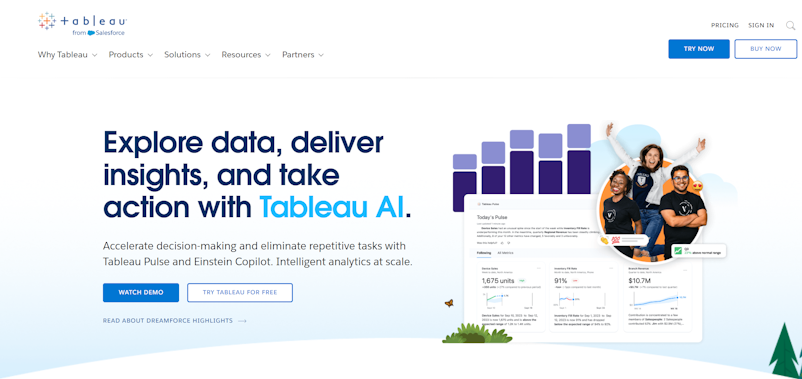
2. Power BI by Microsoft
Power BI is renowned for its deep integration with the Microsoft ecosystem, offering robust analytics and real-time insights:
AI-powered Analytics: Utilizes Azure's AI capabilities for advanced analytics.
Data Connectivity: Connects to a plethora of data sources for streamlined preparation.
Real-time Insights: Offers up-to-the-minute analytics for timely decision-making.
Enhanced Security: Features comprehensive security measures, including encryption and sensitivity labelling.
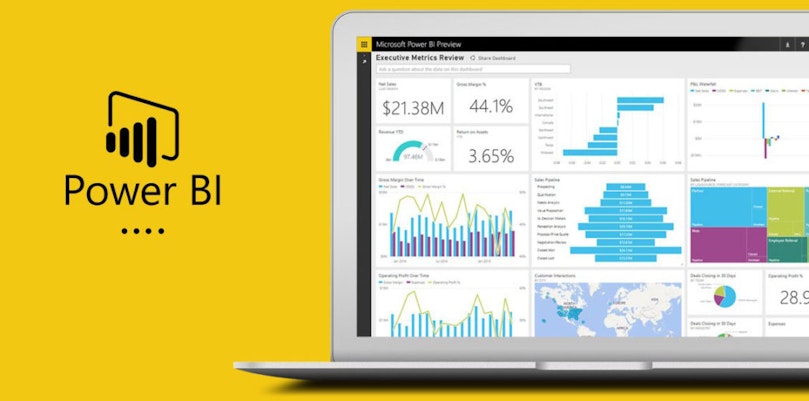
3. Looker Studio (Google Data Studio)
Looker Studio, formerly Google Data Studio, is an online tool for converting data into customizable, informative reports and dashboards. As Google's foray into the BI tool market, Looker Studio provides seamless integration with Google's suite of services, alongside customizable reporting:
Google Integration: Direct connectivity with Analytics, Ads, and other Google services.
Custom Reports: Easy-to-use drag-and-drop report and dashboard creation.
Collaboration: Supports real-time collaboration akin to Google Docs.
Cost-Effectiveness: Free to use, making it accessible for all business sizes.
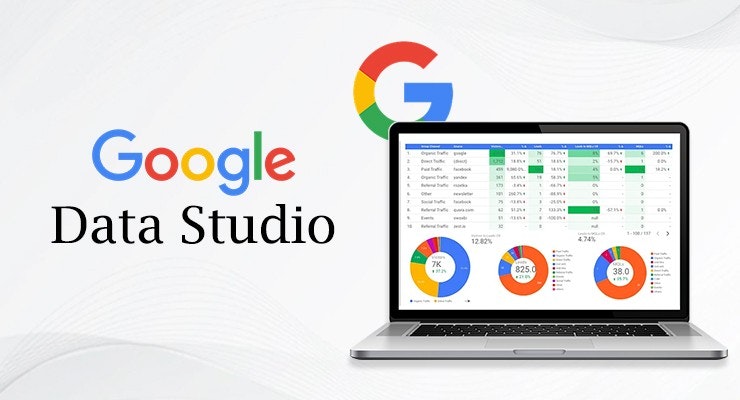
4. IBM Cognos Analytics
IBM Cognos leverages AI to automate and enhance data analysis, offering scalability and security:
Augmented Intelligence: AI automates data prep and discovery.
Sophisticated Analytics: Features for predictive analytics and pattern detection.
Scalability: Meets the needs of both small businesses and large enterprises.
Data Security: Strong governance tools ensure data integrity and security.
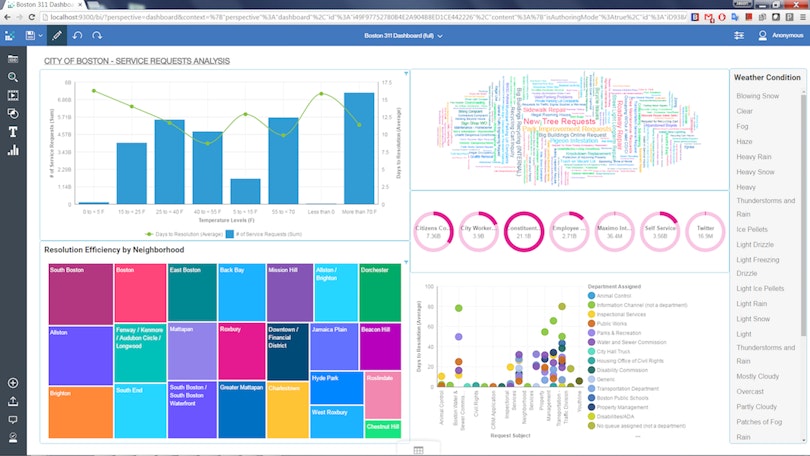
5. SAS Visual Analytics
A powerhouse in advanced data exploration, SAS Visual Analytics offers interactive reporting and predictive modelling:
Advanced Data Exploration: Employs AI and ML for deep data analysis.
Interactive Reporting: Enables the creation of dynamic reports and dashboards.
Data Prep Tools: Comprehensive tools for data cleansing and governance.
Predictive Modeling: Facilitates forecasting with advanced analytics tools.
By leveraging these AI BI tools, businesses can distil vast datasets into actionable insights, fostering data-driven decision-making that propels growth and innovation. Whether you prioritize real-time analytics, user-friendly reporting, or predictive insights, there's a tool tailored to meet your needs.
4 Case Studies of AI in Business Intelligence
AI's use in business intelligence has produced transformative results across industries. By looking at real-life case studies, we can better comprehend the tangible and strategic advantages AI-powered BI solutions provide for businesses. Not only can these success stories demonstrate AI's effectiveness at improving data analytics and decision-making processes but they can also shed light on how organizations can use this powerful technology to drive growth, optimize operations, and remain competitive.
1. Retail Industry: Optimizing Inventory Management
One notable success story from the retail sector involves one major retailer's adoption of AI-driven BI tools to revolutionize their inventory management system. By employing machine learning algorithms to analyze sales data, customer behavior, and supply chain dynamics; they were able to use the predictive insight gained by this machine learning technique to predict product demand with remarkable accuracy, leading them to reduce overstocks and stockouts for more efficient inventory management; ultimately leading to significant cost savings and enhanced customer satisfaction.
2. Healthcare: Enhancing patient care with predictive analytics
AI-powered business intelligence systems were integral in improving patient care in healthcare industries such as medicine. By analyzing vast amounts of patient data - such as medical histories, treatment outcomes, and real-time health indicators - this proactive system could identify health deteriorations or potential emergencies before they occurred, providing healthcare providers with timely interventions that helped enhance both patient outcomes and operational efficiency.

3. Finance: Risk and Fraud Detection
AI-enhanced business intelligence tools have made great strides in risk management and fraud detection within the finance industry. A leading financial institution recently implemented AI algorithms to analyze transaction patterns and customer behavior, pinpointing fraudulent activities with incredible precision. Not only was this AI capability vital in protecting both their customers from financial loss but it also streamlined compliance processes; thus demonstrating all of the multiple benefits AI brings when integrated into BI systems.
4. E-Commerce: Enhancing customer experience
One e-commerce giant harnessed AI for business intelligence to personalize shopping experiences for millions of their users. By analyzing customer interactions, purchase history, and browsing behavior on its platform, personalized product recommendations were tailor-made based on individual preference - leading to greater customer engagement, conversion rates, and loyalty while showing AI's transformative potential for fulfilling customers' needs.
Gain insights into AI startups that are disrupting the BI space by visiting AI Startups. These case studies showcase the profound effect of AI on business intelligence across different industries. By harnessing its power, organizations can realize greater efficiency, innovation, and customer engagement to remain competitive in today's data-driven landscape.
What Are the Future Prospects for AI in Business Intelligence?
As we look toward the horizon, the future of AI in business intelligence BI promises even more groundbreaking innovations and transformative effects across industries. AI integration into BI is not simply a trend but an evolutionary force driving decisions on strategic decision-making, operational efficiency, and customer engagement through data. This transition has been driven by advances in technology, shifting market demands, and an increase in the importance of data as a strategic asset.
Emerging Trends in Business Intelligence Innovation
One of the most exciting trends for AI in business intelligence BI is the continued advancement and integration of machine learning and deep learning technologies, specifically machine learning and deep learning algorithms. These will enhance predictive analytics capabilities by providing more accurate forecasts of market trends, consumer behavior, and business outcomes. Furthermore, as AI models become more sophisticated we can expect them to provide not only insights but also actionable recommendations quickly decreasing time from insight to action taken.
Emerging as another trend is the increased use of natural language processing NLP and generation NLG in business intelligence tools, making data analytics even more accessible to non-technical users, allowing for intuitive queries and understandable reports. This goal aims to democratize data analysis within organizations while cultivating data-driven cultures. Get an inside glimpse into innovative uses of AI in business intelligence and analytics with Adam Fard's AI UX Research Trend. Featuring cutting-edge research and applications.
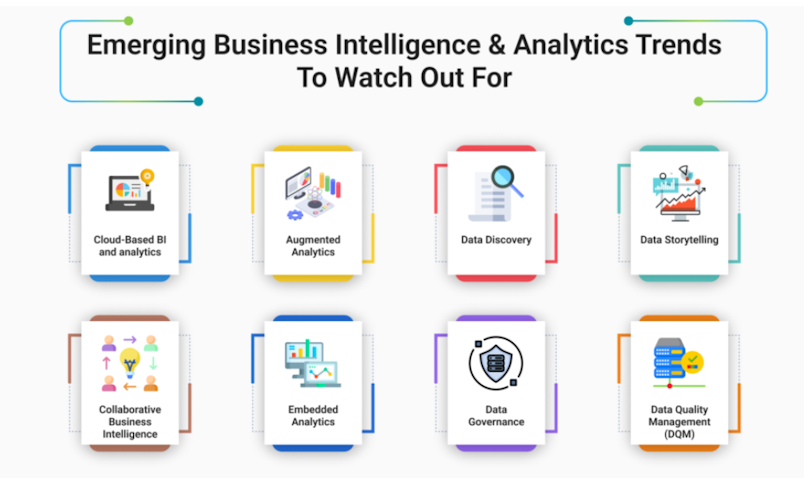
The Future of AI in Business Intelligence and Conclusion
AI and BI will continue to coexist, marked by technological innovations and ethical considerations. Businesses that will thrive are those that not only adopt AI-powered BI tools but also commit to using them responsibly to protect privacy, fairness, and transparency - doing so will not only enhance operational capabilities but also build trust with customers and stakeholders - providing a sustainable path toward growth and success.
AI's integration into business intelligence marks a transformative era, as detailed in TechCrunch’s examination of AI’s role in data analytics and BI, opening new pathways for leveraging data in strategic, innovative, and competitive endeavors. AI in BI will play an increasingly pivotal role in shaping our data-driven future; where insights inform action taken with technology enabling us all to reach further together.
AI in business intelligence marks a fundamental change in how startups and businesses leverage data to drive decisions, streamline operations, and engage customers. AI not only redefined the capabilities of BI tools but also provided access to complex analyses through open APIs - empowering organizations of all sizes to tap the full potential of their data assets. From real-time decision-making and predictive analytics through self-service BI platforms - AI is at the vanguard of business intelligence domain transformation.




